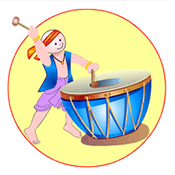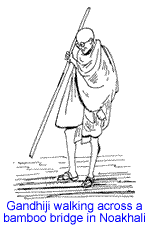
Dimdima
Online Children's Magazine from India

Dimdima
Online Children's Magazine from India
| Apostle of Peace |
|
When the Second World War ended in Europe, people in India hoped that Britain
would soon grant freedom to the country. |
In the Northwest and the Eastern provinces where Muslims were in a majority
there was no enthusiasm for a separate Muslim country at first. The people in
these provinces felt that it would be enough if the provinces were given more
autonomy.
If the Muslim League was finally successful in winning over a large number of
Muslims to its cause it was because it preyed on and exploited the natural fears
of a minority community. The irresponsible utterances of the Hindu Mahasabha
only served to increase the sense of insecurity of the Muslims.
The British who until 1942 had not hesitated to use the 'Divide and Rule' policy
were apparently smitten by conscience. They were now in favour of one strong
united India. The Cabinet Mission came out with several schemes which visualised
the formation of one federation in which Muslim interests would be protected.
Several rounds of talks were held between the Muslim League and the Congress but
neither side was prepared to see the other's point of view or concede that some
of the other's fears may be genuine. When the talks failed to produce
 results,
the Muslim League gave a call for direct action.
results,
the Muslim League gave a call for direct action.
The hartal on 16 August 1946 passed off peacefully all over the country except
Calcutta where Muslims clashed with Hindus. Ten thousand people died and a lakh
were rendered homeless.
Communal riots then broke out in Noakhali in Bengal. Here Hindus were at the
receiving end and thousands of them fled to Bihar. The Hindus of Bihar were
enraged and turned on the Muslims in their province. When the communal fire
threatened to engulf the whole nation, a one-man peace army descended on
Noakhali, in the person of Mahatma Gandhi.
In Noakhali, Gandhiji walked from village to village knocking at the doors of
Muslims and asking to be allowed to stay with them. If the door was slammed in
his face, he would move on to the next house. He would stay in each village
until the Muslims agreed to protect their Hindu neighbours. Others who had come
with him scattered over the district and each one, following Gandhiji's example,
stayed in a village till peace was restored there.
In the meantime an interim government was formed at the centre with Jawaharlal
Nehru at its head.
Freedom was imminent but the dark clouds of communalism had gathered over the
subcontinent and now more than ever the country needed Gandhiji's healing touch
and guidance.
Dimdima is the Sanskrit word for ‘drumbeat’. In olden days, victory in battle was heralded by the beat of drums or any important news to be conveyed to the people used to be accompanied with drumbeats.
Bharatiya Vidya Bhavan
K. M Munshi Marg,
Chowpatty, Mumbai - 400 007
email : editor@dimdima.com
Bharatiya Vidya Bhavan
505, Sane Guruji Marg,
Tardeo, Mumbai - 400 034
email : promo@dimdima.com
Dimdima.com, the Children's Website of Bharatiya Vidya Bhavan launched in 2000 and came out with a Printed version of Dimdima Magazine in 2004. At present the Printed Version have more than 35,000 subscribers from India and Abroad.